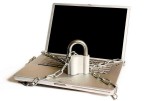Once a computer is connected to the internet, it becomes vulnerable to attacks from a variety of sources, including hackers, botnets, phishing, viruses, Trojan horses, etc. Attacks on computers are variously motiviated. Some want to steal CPU cycles like in a botnet; others want to steal the information in the computer; while some wish to take over the computer completely and release it only if you pay money to the attackers. These activities are not the product of pizza-laden, twinkie suckers in dark bedrooms -- in most cases they are the result of organized criminal activities.
Choose good passwords. One of the ways attackers try to infiltrate is by simply guessing a users password. It is often not even a real person doing the guessing, but another computer running a script or program. The script enables the attacker to try thousands of username/password combinations quickly. Use mixed case as well as at least one numeral or special character and at least 6 characters long. You can get an estimate of the "strength" of your password by using a reputable online password strength analyzer. For example, Microsoft provides secure (HTTPS) access to their password checker (www.microsoft.com/protect/fraud/passwords/checker.aspx)
Do not believe email from strangers or corporations that ask ANY information of you. Email claiming to be from a popular site or a site seemingly well-known to you is used as a lure to gain access to personal information and is called "Phishing." A popular and effective phishing attack claims to be an email from someone in authority at your campus computing center and that in order to take care of something important you must go and log in and verify credentials or provide additional information. The dangerous ones pretend to be from a bank or financial institution. Note that it is a standard policy for any legitimate service provider to never ask for this type of information.
Know the source of any downloaded application, document, or data. That little program may look like what you want, but unless it is from a verifiable source it may be filled with a virus or a botnet. Even after downloading a package always scan it with your virus protections software before opening it or have a real-time virus scanner enabled.
Anti-virus/Anti-spam software and firewalls are programs that are very important in keeping the computer safe. Keep them updated because new viruses are released all the time. Many institutions provide software for free to faculty, staff, and students. In addition, there are some free on-line products that can be obtained for personal use. A recommended free anti-virus software is AVG free which can be found at www.free.avg.com for Microsoft and Linux operating systems. For a free spam checker, try www.malwarebytes.org.
Keep in mind, that there is no way to completely secure a system from online evil doers, short of disconnecting it from the Internet, so choose your passwords thoughtfully, scan everything that is downloaded before installing it, and do not click on links in emails. By following safe computing habits, your computer and the information it contains can be safeguarded from some of the internet villains of today.
Florence "Dez" Wyman is the Systems Administrator at the Long Term Ecological Network Office

 Enlarge this image
Enlarge this image